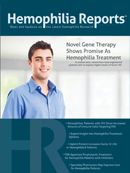Novel Gene Therapy Shows Promise As Hemophilia Treatment
Scientists have successfully engineered platelet cells in dogs to express higher levels of factor VIII, paving the way for further tests in humans.
Researchers from the UNC School of Medicine and the Medical College of Wisconsin recently reported they had successfully tested a method of engineering platelet cells to promote the expression of factor VIII in dogs that have hemophilia A.
People with hemophilia A lack the coagulation factor VIII, leading to frequent severe bleeding incidents. They require frequent factor VIII therapy, which can costs hundreds of thousands of dollars a year.
However, research has shown that 35% or more of people with hemophilia A develop an antibody response that blocks factor VIII therapy, requiring them to receive additional continuous infusions of various protein factors to prevent severe bleeding. This condition is associated with increased mortality and much higher treatment costs, prompting scientists to study ways of counteracting those antibodies or otherwise promoting increased expression of factor VIII in these patients.
According to a news release from the UNC School of Medicine, researchers may have “figured out a potential way around the antibody response” by using gene therapy to engineer platelet precursor cells in dogs with hemophilia A to produce factor VIII.
Tim Nichols, MD, director of the Francis Owen Blood Research Laboratory at UNC, and colleagues isolated specific platelet precursor cells from three dogs that have hemophilia A, engineered the cells to incorporate a gene therapy vector that expresses factor VIII, and then replaced them back in the dogs. The hope was that the altered cells would proliferate and produce new platelets that expressed factor VIII.
“Bleeding events in hemophilia are severe, and without prompt factor VIII replacement, the disease can be crippling or fatal,” Nichols said in the release. “The random and spontaneous nature of the bleeding is a major challenge for people with hemophilia and their families.”
More than two-and-a-half years later, the dogs that received the gene therapy are still expressing factor VIII. The researchers reported that all three have experienced greatly reduced bleeding incidents, with the dog that expressed the highest level of factor VIII experiencing “just one serious event each year over the course of three years.” Prior to receiving the gene therapy, the dogs averaged about five bleeding incidents a year.
“This has been very successful… and now we want to explore the possibility of moving it into human clinical trials for people with hemophilia A,” Nichols said. “The promise and the hope for gene therapy is that people with hemophilia would be given a single therapeutic injection and then would express the protein they are missing for an extended period of time, ideally for years or even their entire lifetimes.”
Results from this study were published in the journal Nature Communications.
